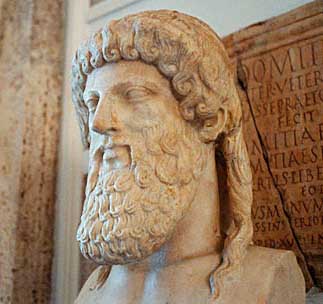|
Introduction
Note: Numbers shown are Stephanus numbers.
Introduction: Plato's Myths
A
SIGNIFICANT amount of Plato's philosophy is expressed in the myths which appear throughout his works.
Several good collections of Plato's myths are available in print (e.g., Partenie, 2004). What is generally missing in previous studies, however, is a sustained attention to the psychological dimension of the myths. In the wake of such writers as Carl Jung and Joseph Campbell, we may take as virtually certain that every myth has psychological meaning; and that, indeed, the very purpose of myth is to express psychological truths.
I have placed Plato's myths online here in order to encourage a paradigm shift, as it were, such that classicists might be more inclined to consider them psychologically, and that psychologists will begin to study them.
It is not my goal, at least at present, to offer detailed psychological interpretations. [1] One reason for this is that the greatest psychological truths which the myths contain probably cannot be stated in exact, analytic terms. Were that possible, Plato himself could have done it; instead, he chose to express certain things, some very subtle, symbolically and allegorically. Secondly, it is surely the case that the very process of searching for the meaning of the myths is integral to understanding them. Thus what I mainly wish to propose is a psychological hermeneutic — certain leading principles and an interpretative approach to Plato's myths — more than specific meanings.
In general I would venture to say this much. Clearly Plato's interests are deeply psychological. He wishes to help his readers attain a mental state, Wisdom, superior to their ordinarily level of psychological function. Man's ordinary condition of mind is, for Plato, a fallen state of intellectual and moral confusion. Plato seeks an ascent of our soul — anagogy.
Our psychological salvation, for Plato, has many dimensions, of course, but some principle ones involve: (1) learning the difference between opinion and knowledge; (2) the metaphysical reality of Goodness, and the necessity of our living virtuous lives in order to gain happiness; (3) the moderation of passions; and (4) the belief that human beings have, in addition to a mortal body, an immortal soul. The last is associated with the Platonic concept of man's dual citizenry: a being that exists simultaneously in the material/temporal world, and in the Eternal realm.
Much work remains to be done understanding the psychological meaning and purpose of Plato's myths. Since writing this extremely brief introduction I have presented several more essays on the subject, listed above. These supply something more closely approximating a theoretical overview and guide for psychological interpretation.
Notes.
1. An exception to this rule is the Phaedrus chariot myth, for which a fairly detailed commentary is supplied.
Bibliography
Addey, Tim.
Seven Myths of the Soul.
Prometheus Trust, 2000.
Addey, Tim.
Myth – The Final Phase of Platonic Education.
The Meadow, Issue 2 (Winter 2005).
Annas, Julia. Plato's Myths of Judgement. Phronesis, 27, 1982,
119–143.
Blössner, Norbert.
"The City-Soul Analogy."
In: Giovanni R. F. Ferrari (ed.), The Cambridge Companion to Plato's
Republic, Cambridge University Press, 2007, pp. 345–385.
Collobert, Catherine; Destrée, Pierre; Gonzalez, Francisco J. (eds.).
Plato and Myth: Studies on the Use and Status of Platonic Myths.
Leiden: Brill, 2012
Dillon, John. Plato's Myths in the Later Platonist Tradition. In: Catalin Partenie (ed.),
Plato. Selected Myths, Oxford University Press, 2004, pp. xxvi–xxx.
Edinger, Edward. F. (author); Wesley, Deborah A. (contributor).
Eternal Drama: The Inner Meaning of Greek Mythology.
Boston: Shambhala, 2001.
ISBN 1570626731.
Edmonds, R. G.
Myths of the Underworld Journey. Cambridge University Press, 2004.
Frutiger, Perceval.
Les Mythes de Platon.
New York: Arno Press, 1976 (1st ed. 1930).
Jowett, Benjamin. The Myths of Plato.
In: Benjamin Jowett, The Dialogues of Plato in Five Volumes 3rd edition,
vol. 2, pp. 316–324. Oxford University Press, 1892.
Kingsley, Peter.
Ancient Philosophy, Mystery, and Magic: Empedocles and Pythagorean Tradition.
Oxford University Press, 1997.
ISBN 0198150814.
Kingsley, Peter.
In the Dark Places of Wisdom.
Duckworth, 2001
ISBN 0715631195.
(255 pages) (Parmedides)
Kingsley, Peter.
Reality.
Golden Sufi Center, 2003.
ISBN 1890350087.
Line, Jill.
A Vision of the True Earth.
The Meadow, Issue 3.
Morgan, Kathryn A.
Myth and Philosophy from the Pre-Socratics to Plato.
Cambridge University Press, 2000.
ISBN 1139427520.
Neumann, Erich.
The Origins and History of Consciousness.
Princeton University Press, 1970 (Bollingen, 1954).
ISBN 0691017611.
Partenie, Catalin (editor).
Plato. Selected Myths.
Oxford University Press, 2004.
ISBN 0192805088.
Partenie, Catalin (editor).
Plato's Myths.
Cambridge University Press, 2009.
ISBN: 0521887909.
Partenie, Catalin.
Plato's Myths. The Stanford Encyclopedia of Philosophy
(Fall 2011 Edition), Edward N. Zalta (ed.), < plato.stanford.edu/archives/fall2011/entries/plato-myths/ >.
Porphyry, Thomas Taylor (translator).
On the Cave of the Nymphs.
John M. Watkins, 1917.
Stewart, J. A.
The Myths Of Plato.
Macmillan, 1905.
Taylor, Thomas.
The Wanderings of Ulysses. In: Thomas Taylor, Selected
Works of Porphyry, pp. 271–271 (Appendix), London: Thomas Rodd, 1823.
Thackara, W. T. S. Plato's Myths and the Mystery Tradition
. Sunrise (magazine), December 1988/January 1989.
Uebersax, John S.
Did Plato Believe in Reincarnation?, 2007.
< john-uebersax.com/plato/plato4.htm >.
Uebersax, John S. Analysis of Plato's Chariot Allegory, 2007.
< john-uebersax.com/plato/plato3.htm > .
| 
